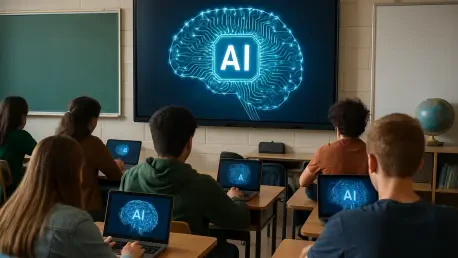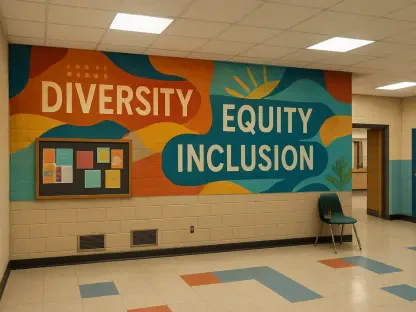The educational landscape is undergoing significant transformations as artificial intelligence (AI) technologies become increasingly integral in various learning and teaching modalities. At the forefront of this evolution, the University of California, Los Angeles (UCLA) has established an Advisory Committee on AI in Teaching and Learning, a dedicated body to address the multifaceted impact of AI within higher education. Launched in the spring of 2025, this committee seeks to guide the institution in navigating the complexities and opportunities posed by AI, enhancing the academic experience for both students and educators. A survey conducted in 2024 showed profound engagement with AI, revealing that 66% of UCLA students had used generative AI tools for activities like brainstorming, research, and exam preparation. This trend underscores the necessity for structured institutional responses to ensure that technological integration aligns with educational objectives.
The Expanding Role of AI in Education
AI’s Pervasive Influence on Higher Education
AI’s presence in the academic realm extends beyond mere novelty, becoming a crucial component of both research and instruction. Its capabilities are reshaping traditional paradigms of teaching and learning at institutions like UCLA. The university aims to meld cutting-edge AI applications with high-quality educational practices, enhancing the collegiate experience without compromising academic standards. The newly formed Advisory Committee, comprising students, faculty, and staff, is pivotal in guiding this integration process. The committee’s primary mission is to conceptualize AI’s role in academic environments and recommend pertinent infrastructure investments. Such strategic oversight ensures that AI aids in educational advancement while safeguarding the integrity of instruction.
Strategic Objectives and Committee Responsibilities
The committee has the mandate to address several key areas: enabling instructors through AI, developing innovative resources and programs, and launching initiatives via the UCLA Teaching and Learning Center (TLC). Emphasizing AI literacy and accessibility, the committee also intends to focus on generative AI’s impact and leverage asset-based applications to enrich learning experiences. Part of their work involves upskilling instructors to ensure they are adept in utilizing AI technologies effectively. This approach combines research-backed guidance with practical solutions, fostering a comprehensive strategy for AI adoption. Ensuring that AI is employed responsibly and effectively, the committee seeks to provide a robust framework for leveraging these emerging technologies in a way that enhances rather than diminishes educational quality.
Institutional Cohesion in AI Application
The Importance of Unified Vision
A cohesive institutional approach to AI implementation is essential in maintaining high standards of education. Vice Provost Erin Sanders O’Leary articulates the necessity of involving stakeholders from various campus segments to sustain high-quality instruction. The committee’s work serves as a conduit for uniting diverse campus units in a shared vision for AI’s application in classrooms. This synergy is crucial in harnessing AI’s potential across different disciplines, ensuring that its integration aligns with the university’s broader educational mission. Furthermore, Executive Vice Chancellor Darnell Hunt highlights the imperative of strategic guidance for the Bruin community, illustrating the coordinated effort required to align AI applications with pedagogical goals.
Diverse Representation and Strategic Leadership
Featuring a diverse membership, the Advisory Committee benefits from the expertise of representatives from UCLA’s Digital and Technology Solutions, the Academic Senate, the DataX Initiative, and other key entities. Co-chaired by Chris Mattmann, UCLA’s inaugural chief data and AI officer, and Kem Saichaie, the executive director of TLC, the committee is strategically positioned to explore and address the intricate intersections of AI with education. This comprehensive representation ensures that the committee can anticipate and respond to the distinct challenges posed by AI’s integration into academic settings. With various campus sectors contributing to discussions, UCLA is well-equipped to implement AI-driven solutions that resonate with the institution’s academic philosophy and goals.
Navigating Opportunities and Challenges
Balancing AI’s Potential with Pedagogical Needs
AI’s integration offers unparalleled opportunities for students but also presents substantial challenges that need careful consideration. Alex Bui of the David Geffen School of Medicine emphasizes the importance of evaluating AI usage across pedagogical practices and academic operations. The implications of AI adoption vary significantly across disciplines, necessitating tailored solutions that align with specific departmental objectives. In the humanities, for instance, innovative curricula must capitalize on AI’s potential to stimulate critical thinking and creativity, departing from traditional methods in favor of fostering skills relevant to the contemporary world.
Rethinking Educational Assessments
Assistant Professor Elisa Kreiss of UCLA’s Department of Communication points out the need to reevaluate traditional evaluation metrics in light of AI’s influence. As AI tools provide shortcuts in the learning process, educators face the challenge of designing assessments that accurately reflect a student’s understanding and learning rather than simply measuring AI-assisted outcomes. This necessitates a paradigm shift in how success is defined and evaluated in educational contexts, with an emphasis on developing assessment frameworks that measure genuine intellectual engagement and skill acquisition.
Embracing the Future of Learning
Future Directions and Adaptation to Evolving AI
As UCLA continues to explore AI’s evolving role within higher education, insights from the Advisory Committee will be instrumental in shaping future strategies. The committee’s emphasis on educational innovation underscores the need to remain vigilant regarding AI’s impact on students and instructors alike. By fostering an academic environment where AI enhances rather than detracts from authentic learning experiences, UCLA endeavors to lead the way in integrating AI responsibly and effectively in its educational mission. The institution is poised to adapt to the changing technological landscape, ensuring that the use of AI in education remains both relevant and beneficial.
Key Takeaways and Path Forward
AI is increasingly integral to academia, far surpassing its initial status as a mere curiosity. This transformational technology is becoming a vital force in both educational methodologies and academic research, especially at universities like UCLA. Leaders at UCLA are committed to weaving state-of-the-art AI tools with robust educational practices, thus enriching the university experience without sacrificing scholarly excellence. A newly established Advisory Committee, including students, faculty, and staff, is key to steering this integration. The committee’s main focus is to determine AI’s function within academic settings and suggest strategic investments in infrastructure that are necessary. By offering strategic direction, the committee ensures AI enhances educational progress while preserving the core values and integrity of instruction. As AI continues to evolve, UCLA’s approach highlights the critical balance between innovation and maintaining educational standards in higher learning environments.









